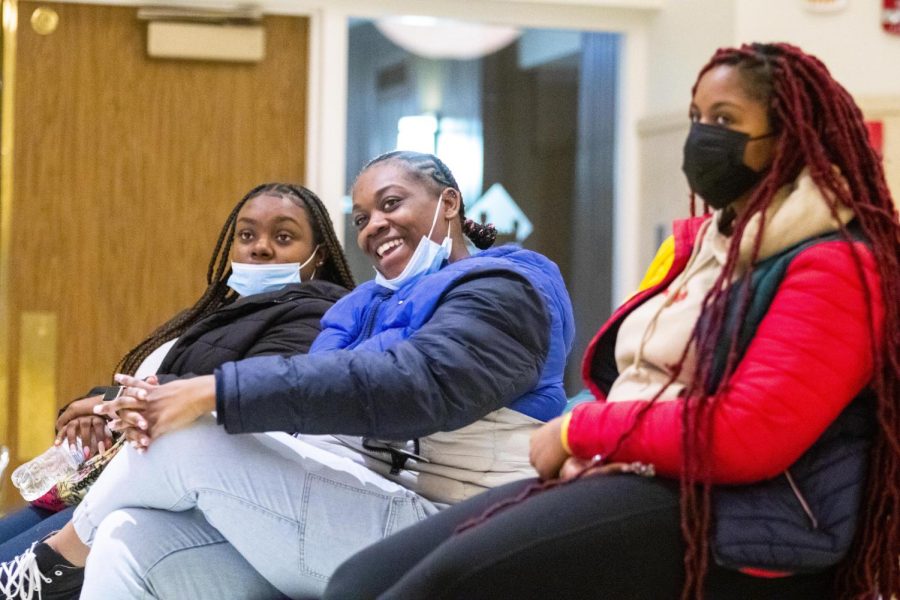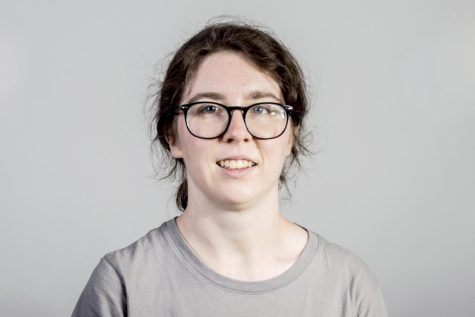Talk with Strong S.H.E. about Black women in reality TV Tuesday
From left to right, Elajah Brazzleton, a freshman early childhood education major, De’Shiya Hughes, a freshman psychology major, and Alicia Ferguson, a broadcast journalism major, have discussions about black women on reality television and relate it to their own lives and how they personally feel during the “Black Women and Reality TV…Is it For the Culture?” in the University Ballroom of Martin Luther King Jr. University Union Tuesday night.
February 15, 2022
As part of African American History Month, Eastern’s chapter of Strong S.H.E gave a presentation Tuesday night titled Black Women and Reality TV… Is it For the Culture!
The presentation and discussion were held by Strong S.H.E. Secretary Arteja Benson-Connor, a senior psychology major.
Benson-Carter thinks that Strong S.H.E.’s mission adhered well to the Feb. 15 event.
“I think (our mission adheres) because reality TV can be very misconstrued,” Benson-Carter said. “And we all know that sometimes it’s not real. I think it’s important that we talk about how these depictions of us, on screen and on TV, make us look and what it’s actually doing for our culture. Is it bettering us or is it helping us because most times these shows are around drama and fighting? And is that helping advance us as black women? And that’s basically what we’re going to talk about today. We’re going to talk about how it affects us, how it affects them on screen and off screen, and basically just have a discussion about what reality TV is doing for black women.”
Some reality television shows discussed were “Real Housewives of Atlanta” and “Bad Girls Club.”
Some members in the audience said when they were younger; they wanted to be on these types of shows, but now realize how harmful they can be.
Elajah Brazzleton, a freshman early childhood education major, said that the perception of black women from reality television shows put on a personality.
“I really think it’s such a drama, nasty, gossip (filled environment),” said Brazzleton. “(There’s) Definitely a lot of fighting.”
When this happens, black women may feel unsafe. This is where Strong S.H.E., to help check in on Eastern’s black female community.
Benson-Carter says that in light of these shows, Strong S.H.E. hopes to make students feel safe.
“Strong S.H.E. is basically a group of black women on campus,” said Benson-Carter. “Our motives and our goal and the mission statement is to basically create a safe place for a black woman on campus, a place to come and talk to discuss things that are going on in the world. (such as) News, what’s going on in our lives. We do mental health check-ins. Basically, we just come in. It’s like a group where you can come and be yourself and make friends.”
Even though there are these stereotypes, Brazzleton hopes that they can be knocked down. Brazzleton hopes white viewers see black women for who they are.
“I really feel like they think we are uneducated,” said Brazzleton. “(They see us as) not classy, or we are portrayed as not smart. We have no type of personality because of what they see on TV. I see comments, Twitter comments, Facebook comments about how ‘Oh, she’s his daughter. Oh, she’s just finally started tonight.’ But really the room session is that they’re acting. This is TV. It’s just a screen to watch, and it’s very bad because it’s hatred towards us. And I don’t think that’s right. They’re basically judging.”
However, Benson-Carter thinks that people can learn from these shows and think about the harm of these shows.
“I hope tonight we can just think about when we watch it, what is it doing for us?” Benson-Carter said. “What does it leave us with? Does it make us feel good or are we just there for the drama? How can we see these different depictions and not take them all in and just keep them with a grain of salt?”
Katja Benz can be reached at 581-2812 or at [email protected].















































